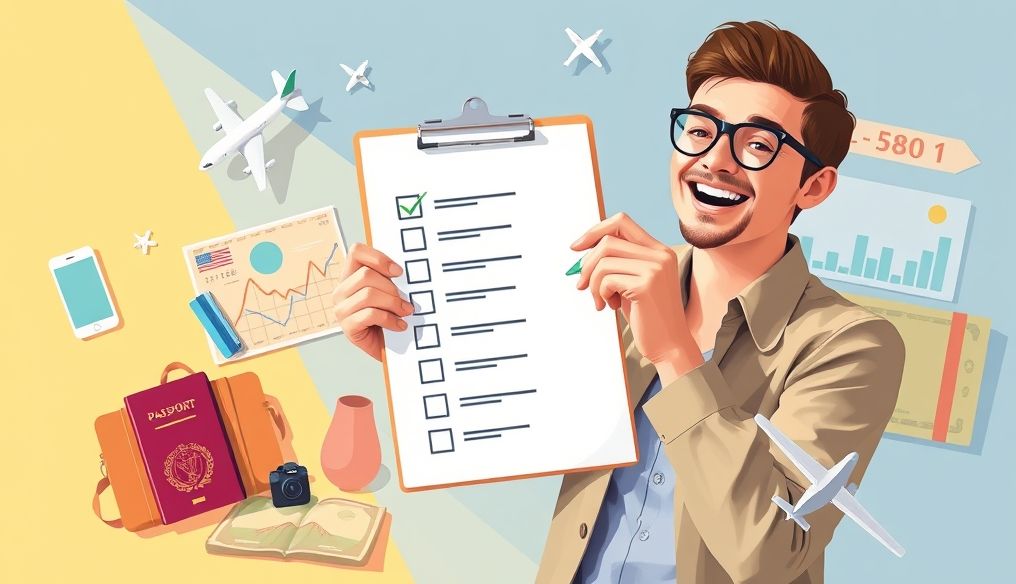Does Planning Trips in Advance Really Save Money?
Planning trips in advance is a topic that sparks widespread debate. Some prefer spontaneity and adventure in travel, while others believe that careful planning is the key to an enjoyable and economical experience. In this article, we will explore in depth how planning ahead can save money, and what strategies you can follow to maximize your trip.
1. Why is Planning Ahead Important for Saving Money?
Planning ahead gives you the ability to control many financial aspects of your trip, reducing the chances of random and unnecessary spending. Here are some key reasons:
- Getting the Best Deals: Airlines and hotels often offer deals and discounts for early bookings.
- Avoiding High Prices in Tourist Seasons: Prices rise significantly during tourist seasons, and planning ahead allows you to book before these increases.
- Comparing Available Options: Planning ahead gives you enough time to compare different options for accommodation, transportation, and activities, and choose the most suitable for your budget.
- Avoiding Hasty Decisions: When you are under time pressure, you may make ill-considered financial decisions. Planning ahead gives you time to think carefully and make informed decisions.
2. Early Flight Bookings: The Secret Behind Saving
Booking flight tickets early is one of the most effective ways to save money. Prices are often much lower several months before the trip. Here are some tips to make the most of early flight bookings:
- Search for tickets 3-6 months before the trip: This time frame is ideal for getting the best prices.
- Use specialized price comparison search engines: Sites like Skyscanner, Google Flights, and Kayak help you find the cheapest deals.
- Be flexible with travel dates: Traveling on weekdays (such as Tuesday and Wednesday) is often cheaper than traveling on weekends.
- Subscribe to airline newsletters: Airlines often send special offers to their subscribers.
Example: Imagine you are planning a trip to Paris in December. If you book the flight ticket in September, you might pay $500. But if you wait until November, you may find that the price has risen to $800 or more.
3. Accommodation: How to Find the Best Deals?
Accommodation costs are a large part of the travel budget. Here are some ways to save money on accommodation:
- Early Hotel Booking: As with flight tickets, hotels often offer discounts for early bookings.
- Using Hotel Comparison Sites: Sites like Booking.com, Expedia, and Hotels.com help you find the best deals.
- Consider Alternative Accommodation Options: Airbnb, hostels, and hotel apartments can be much cheaper than traditional hotels.
- Traveling Outside Tourist Seasons: Prices are much lower during periods when there is not a large influx of tourists.
- Looking for Special Offers: Some hotels offer special offers such as staying an extra night for free or discounts on meals.
4. Planning Activities and Tours in Advance
Activities and tours can add a lot to your experience, but they can also be expensive. Here are some tips to save money in this aspect:
- Pre-booking Tours and Activities: Prices are often cheaper when booking online in advance.
- Looking for Deals and Discounts: Many tourist companies offer special offers or discounts for groups.
- Taking Advantage of Free Activities: Many cities offer free activities such as free tours, visiting museums on certain days, or attending local events.
- Buying City Cards: Some cities offer cards that allow you to enter many tourist attractions at discounted prices.
5. Budgeting and Comprehensive Financial Planning
Creating a comprehensive budget is an essential step to ensure that you do not exceed your spending limits. Here are some tips for creating an effective budget:
- Estimating Expected Costs: Estimate the costs of flights, accommodation, food, transportation, activities, and shopping.
- Determining the Amount Allocated to Each Item: Determine the amount you can spend on each aspect of your trip.
- Allocating an Emergency Fund: It is important to allocate an additional amount for unexpected emergencies.
- Tracking Your Expenses: Use an app or spreadsheet to track your expenses during the trip and make sure you stick to the budget.
6. Transportation: Saving Options
Transportation costs can add up quickly, especially if you rely on taxis or private transportation services. Here are some ways to save money on transportation:
- Using Public Transportation: Buses, trains, and subways are often much cheaper than taxis.
- Buying Daily or Weekly Transportation Tickets: These tickets allow you to use public transportation unlimitedly for a specified period.
- Walking or Renting Bicycles: These options are not only economical but also a great way to explore the city.
- Sharing Taxis with Others: If you are traveling with a group, you can share a taxi to reduce costs.
7. Food and Drink: How to Reduce Expenses?
Eating at restaurants every day can be expensive. Here are some ways to save money on food and drink:
- Having Breakfast at the Hotel or Accommodation: Many hotels offer a free breakfast.
- Buying Food from Supermarkets: You can buy snacks and drinks from supermarkets instead of buying them from restaurants or cafes.
- Cooking at the Accommodation: If you are staying in a hotel apartment or Airbnb, you can cook some meals yourself.
- Looking for Cheap Local Restaurants: Local restaurants are often cheaper than tourist restaurants.
- Taking Advantage of Lunch Offers: Many restaurants offer special offers on lunch meals.
8. Travel Insurance: Protecting Your Money
Travel insurance is a necessary investment to protect your money in case of any emergency. Here are some reasons why travel insurance is important:
- Covering Medical Costs: In case of illness or injury during the trip, travel insurance can cover exorbitant medical costs.
- Covering Trip Cancellation or Delay: If you have to cancel or delay your trip due to unexpected circumstances, the insurance can compensate you for financial losses.
- Covering Loss or Theft of Luggage: If your luggage is lost or stolen, the insurance can compensate you for the value of the lost items.
9. Flexibility and Adapting to Changing Circumstances
Despite the importance of planning ahead, it is also important to be flexible and able to adapt to changing circumstances. There may be flight delays, changes in plans, or unexpected opportunities. Here are some tips:
- Be Prepared to Change: Accept that things may not always go as planned.
- Look for Alternatives: If there is a flight delay, look for alternative transportation or accommodation options.
- Take Advantage of Unexpected Opportunities: If an opportunity arises to visit a new place or experience an exciting activity, do not hesitate to take advantage of it.
10. Conclusion: Planning Ahead = Saving Money + Better Experience
In short, planning trips in advance can save you a lot of money and ensure a more enjoyable and relaxing travel experience. By booking flight tickets and accommodation early, planning activities and tours in advance, creating a comprehensive budget, and taking advantage of cheap transportation and food options, you can reduce expenses and enjoy an unforgettable trip.




